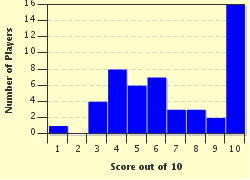Quiz Answer Key and Fun Facts
1. When Mustafa Kemal was born in 1881, the Republic of Turkey was far from established. Of course, he lived under the rule of which centuries-old powerful empire?
2. Kemalism, the philosophy established by Mustafa Kemal, is based on "Altı ok", which is Turkish for what?
3. The first of the six principles of Kemalism is Republicanism, which abolishes which very integral law behind Ottoman rule?
4. The second principle of Kemalism was one that eventually gave women the right to vote in 1934. Which of the six is known in Turkish as "halkçılık"?
5. The third principle of Kemalism, Secularism, states which of the following?
6. Atatürk's fourth principle, "inkılâpçılık" or Turkish for Revolutionism, can be described as the exact opposite of what ideology?
7. The fifth principle of Kemalism advocates the strength of Turkish Nationalism. Atatürk promoted the pride of the Turkish nationalist movement by coining the phrase: "Ne mutlu Türküm diyene!" as opposed to pro-monarchy slogans the sultans advocated during their reign. This means "How happy is one who calls himself a Turk!"
8. The last of the six reforms was Atatürk's successful attempt to improve the country's economy through state intervention. This principle is referred to as what?
9. Atatürk was adamant about improving communication in his country. As a result, he worked towards eliminating Ottoman Turkish and crafted a new Latin-variant Turkish alphabet which is still in use today (part of this quiz is written in it!). In what script was Ottoman Turkish written?
10. It was with great sorrow that the global community heard of this great leader's death in 1938. At which great Turkish palace was "the Father of the Turks" residing at the time of his death?
Source: Author
dim_dude
This quiz was reviewed by FunTrivia editor
stedman before going online.
Any errors found in FunTrivia content are routinely corrected through our feedback system.

